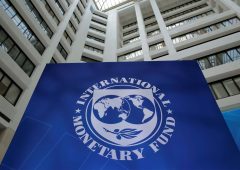Canada Cuts Interest Rates for Fourth Time as Inflation Drops Below Target
24.10.2024 16:00 1 min. read Kosta Gushterov
In a surprising move, the Bank of Canada announced its fourth consecutive interest rate reduction on Wednesday, dropping the key rate by 50 basis points to 3.75%.
This significant cut, the largest in over four years, reflects a decline in inflation, which fell to 1.6% in September, below the bank’s target of 2%.
After previously raising rates to combat soaring prices, the central bank has shifted its approach since June, implementing a total of 75 basis points in cuts.
During the news conference following the announcement, Governor Tiff McLem expressed optimism, stating that Canadians could feel relieved as the long battle against inflation is finally showing positive outcomes.
Despite these cuts, economic indicators remain subdued, with weak demand, sluggish business sales, and low consumer confidence hindering growth. McLem is hopeful that the latest rate adjustment will stimulate demand and encourage economic activity.
Meanwhile, the U.S. Federal Reserve has also begun a rate-cutting cycle, prompting speculation about a possible significant cut in December.
-
1
U.S. PCE Inflation Rises for First Time Since February, Fed Rate Cut Likely Delayed
27.06.2025 18:00 1 min. read -
2
Key U.S. Economic Events to Watch Next Week
06.07.2025 19:00 2 min. read -
3
Gold Beats U.S. Stock Market Over 25 Years, Even With Dividends Included
13.07.2025 15:00 1 min. read -
4
U.S. Announces Sweeping New Tariffs on 30+ Countries
12.07.2025 16:30 2 min. read -
5
US Inflation Heats Up in June, Fueling Uncertainty Around Fed Cuts
15.07.2025 16:15 2 min. read
US Inflation Heats Up in June, Fueling Uncertainty Around Fed Cuts
U.S. inflation accelerated in June, dealing a potential setback to expectations of imminent Federal Reserve rate cuts.
Gold Beats U.S. Stock Market Over 25 Years, Even With Dividends Included
In a surprising long-term performance shift, gold has officially outpaced the U.S. stock market over the past 25 years—dividends included.
U.S. Announces Sweeping New Tariffs on 30+ Countries
The United States has rolled out a broad set of new import tariffs this week, targeting over 30 countries and economic blocs in a sharp escalation of its trade protection measures, according to list from WatcherGuru.
Key U.S. Economic Events to Watch Next Week
After a week of record-setting gains in U.S. markets, investors are shifting focus to a quieter yet crucial stretch of macroeconomic developments.
-
1
U.S. PCE Inflation Rises for First Time Since February, Fed Rate Cut Likely Delayed
27.06.2025 18:00 1 min. read -
2
Key U.S. Economic Events to Watch Next Week
06.07.2025 19:00 2 min. read -
3
Gold Beats U.S. Stock Market Over 25 Years, Even With Dividends Included
13.07.2025 15:00 1 min. read -
4
U.S. Announces Sweeping New Tariffs on 30+ Countries
12.07.2025 16:30 2 min. read -
5
US Inflation Heats Up in June, Fueling Uncertainty Around Fed Cuts
15.07.2025 16:15 2 min. read


